Our Blog
Check out our innovative pump solutions and industry insights to see what's new in the pumping industry. Stay up to date with the latest trends and news in the world of pumping technology by following our pumping technology blog.
- Home
- Blog
Exploring the Efficiency of Deep Well Pumps in Sustainable Agriculture Practices
 In the context of sustainable agriculture, the efficiency of deep well pumps plays a pivotal role in optimizing water usage and enhancing crop yields. According to the Food and Agriculture Organization (FAO), water scarcity affects over 2 billion people globally, and efficient irrigation practices are essential for maintaining agricultural productivity in water-limited regions. Deep well pumps, which can extract groundwater from significant depths, are increasingly being adopted in various parts of the world to ensure a reliable water supply for irrigation. A report by the International Water Management Institute (IWMI) indicates that transitioning to energy-efficient deep well pumps can reduce energy costs by up to 30%, thereby promoting more sustainable farming methods. As farmers seek to balance operational costs with sustainability, understanding the effectiveness of deep well pump systems will be critical in shaping the future of agricultural practices that not only meet food demands but also conserve vital water resources.
In the context of sustainable agriculture, the efficiency of deep well pumps plays a pivotal role in optimizing water usage and enhancing crop yields. According to the Food and Agriculture Organization (FAO), water scarcity affects over 2 billion people globally, and efficient irrigation practices are essential for maintaining agricultural productivity in water-limited regions. Deep well pumps, which can extract groundwater from significant depths, are increasingly being adopted in various parts of the world to ensure a reliable water supply for irrigation. A report by the International Water Management Institute (IWMI) indicates that transitioning to energy-efficient deep well pumps can reduce energy costs by up to 30%, thereby promoting more sustainable farming methods. As farmers seek to balance operational costs with sustainability, understanding the effectiveness of deep well pump systems will be critical in shaping the future of agricultural practices that not only meet food demands but also conserve vital water resources.
Understanding Deep Well Pumps: Mechanisms and Efficiency Metrics
Deep well pumps play a crucial role in sustainable agriculture by facilitating efficient water extraction in areas where surface water is scarce. Understanding the mechanisms of these pumps is essential to appreciate their role in optimizing water usage. Typically, deep well pumps operate using a submersible motor that drives impellers, allowing for the lifting of groundwater from depths that often exceed 100 meters. According to the U.S. Department of Agriculture (USDA), proper selection and installation of deep well pumps can enhance water delivery efficiency by up to 85%, thereby reducing energy consumption and operational costs significantly.
Efficiency metrics for deep well pumps encompass a variety of parameters, including hydraulic efficiency, volumetric efficiency, and overall pump efficiency. Industry reports indicate that the best practices in pump design can lead to a reduction in energy costs by as much as 25%, while also maximizing the yield per acre of irrigated land. Furthermore, the Energy Policy Act outlines standards that aim to ensure that pumps operate within their best efficiency point (BEP), promoting not only sustainability but also economic viability for farmers. As agricultural practices evolve towards more resource-conscious methods, the emphasis on the efficiency of deep well pumps represents a pivotal aspect of sustainable farming initiatives.
Efficiency of Deep Well Pumps in Sustainable Agriculture
This chart illustrates the efficiency of various deep well pump models, reflecting their performance in sustainable agricultural practices. The efficiency percentages highlight the effectiveness of each pump in delivering water sustainably.
Evaluating the Role of Deep Well Pumps in Water Resource Management
Deep well pumps play a critical role in water resource management, particularly in regions facing water scarcity. According to the International Water Management Institute (IWMI), approximately 70% of global water withdrawals are for agriculture, making efficient water management essential for sustainable agricultural practices. Deep well pumps enable farmers to access underground aquifers, providing a reliable water source that can significantly enhance crop yields in arid and semi-arid regions.
Recent data from the Food and Agriculture Organization (FAO) indicates that the adoption of advanced deep well pumping systems can lead to a 30-50% reduction in operational costs while improving irrigation efficiency. By optimizing water usage, these pumps help mitigate the risks associated with droughts and water shortages, ensuring that farmers can maintain their productivity even under challenging climatic conditions.
Moreover, with the increasing emphasis on sustainable agriculture, investing in efficient deep well pumps not only supports local economies but also contributes to the overall resilience of agricultural systems in the face of global water challenges.
Sustainable Agriculture: Integrating Deep Well Pumps into Farming Practices
Sustainable agriculture has increasingly turned to technology to enhance efficiency and resource management, with deep well pumps emerging as a crucial element in these practices. According to the International Water Management Institute, over 70% of irrigation in developing regions relies on groundwater, emphasizing the importance of efficient water extraction methods. Deep well pumps facilitate access to these vital water resources, allowing farmers to irrigate their crops more effectively, especially in areas prone to drought. These pumps not only optimize water usage but also minimize energy consumption, aligning with sustainability goals.
Research from the Food and Agriculture Organization indicates that integrating modern deep well pumps in farming practices can increase crop yields by up to 30%. This increase is attributed to the ability to maintain consistent irrigation schedules, thus enhancing plant growth and overall productivity. Furthermore, advancements in pump technology, such as solar-powered systems, are reducing dependency on traditional energy sources, further reinforcing the sustainable framework in which modern agriculture operates. By adopting deep well pump solutions, farmers can not only improve their crop output but also contribute to the conservation of water resources essential for future generations.
Maximizing Crop Yields: Best Practices for Deep Well Pump Usage
 Maximizing crop yields using deep well pumps entails implementing best practices that enhance efficiency and sustainability in agriculture. Properly sizing and selecting the right pump for specific crops and soil conditions is essential. This ensures that adequate water is available without excessive energy consumption. Regular maintenance is also critical; checking for wear and tear, cleaning filters, and ensuring proper alignment can significantly extend the lifespan of the pump while ensuring optimal performance.
Maximizing crop yields using deep well pumps entails implementing best practices that enhance efficiency and sustainability in agriculture. Properly sizing and selecting the right pump for specific crops and soil conditions is essential. This ensures that adequate water is available without excessive energy consumption. Regular maintenance is also critical; checking for wear and tear, cleaning filters, and ensuring proper alignment can significantly extend the lifespan of the pump while ensuring optimal performance.
Additionally, timing the irrigation schedules to align with crop needs can further boost yields. Utilizing soil moisture sensors helps in determining the right time to irrigate, preventing over-watering and water wastage. Furthermore, integrating deep well pumps with renewable energy sources, such as solar panels, can reduce operational costs and promote a greener approach to farming.
By adopting these best practices, farmers can effectively manage water resources, increase productivity, and contribute to sustainable agricultural practices.
Case Studies: Success Stories of Deep Well Pumps in Sustainable Farming
 Deep well pumps are proving to be an essential technology in sustaining agricultural practices, especially in regions facing critical water shortages. For instance, in areas like India, where the water footprint is increasingly affected by various agricultural policies, the use of deep well pumps provides farmers with consistent access to groundwater, crucial for maintaining crop yields. According to reports, excessive groundwater withdrawals have led to a significant decline in aquifer levels globally, threatening food security and livelihoods. Implementing efficient deep well pumping systems can help mitigate these issues by optimizing water usage and reducing dependency on surface water sources.
Deep well pumps are proving to be an essential technology in sustaining agricultural practices, especially in regions facing critical water shortages. For instance, in areas like India, where the water footprint is increasingly affected by various agricultural policies, the use of deep well pumps provides farmers with consistent access to groundwater, crucial for maintaining crop yields. According to reports, excessive groundwater withdrawals have led to a significant decline in aquifer levels globally, threatening food security and livelihoods. Implementing efficient deep well pumping systems can help mitigate these issues by optimizing water usage and reducing dependency on surface water sources.
Case studies across different agricultural sectors showcase successful implementations of deep well pumps. For example, farmers in certain regions have reported a 30% increase in crop yields due to reliable irrigation provided by deep well systems. These success stories highlight that investing in efficient pumping technology not only conserves water but also enhances productivity, leading to more sustainable farming practices.
Tips: When considering deep well pumps for sustainable agriculture, it’s beneficial to assess the specific water needs of crops and evaluate the aquifer levels regularly. Additionally, farmers should explore partnerships with technology providers to ensure they are employing the most efficient systems available. Keeping abreast of the latest innovations in pumping technology can also greatly enhance water management strategies.
Related Posts
-
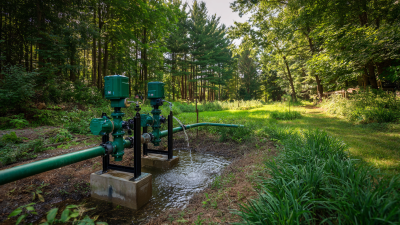
Top 5 Benefits of Upgrading Your Well Pumps for Improved Water Quality and Efficiency
-

Understanding the Innovations of Pump Manufacturers in Modern Industrial Applications
-
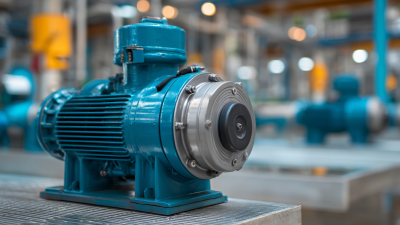
Unlocking Efficiency: The Ultimate Guide to Choosing the Right Motor Pump for Your Needs
-
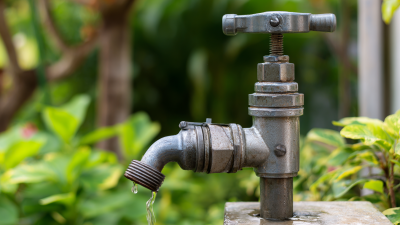
Essential Guide to Choosing the Perfect Well Water Pump for Your Home Needs
-
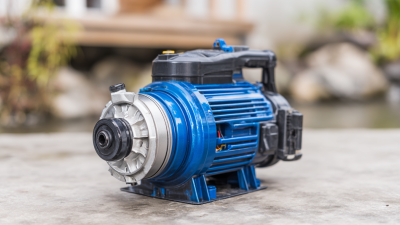
Exploring the Efficiency of Submersible Water Pumps: A Comprehensive Guide for Homeowners
-
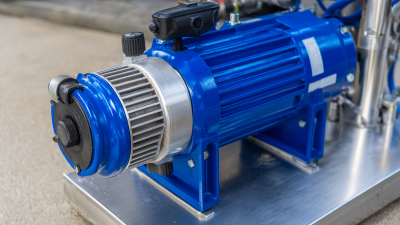
Understanding the Benefits of Using a 1 Hp Well Pump for Efficient Water Supply

